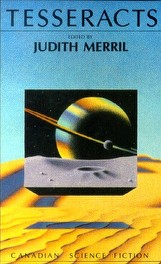
| The Works of Judith Merril |
|
"That Only a Mother" was Merril's debut story in 1948, published in both Daughters of Earth and The Best of Judith Merril. This story, set in a post nuclear holocaust era, depicted a mother's reaction to radiation's effect on her daughter. The main character, Margaret, is presented in such a way that the reader can sympathize with her and experience the joy she feels as she eagerly awaits the birth of her first child, Henrietta. Through letters to her husband, Hank, the reader is able to understand Margaret's sheer joy in her daughter. Only when Hank returns home, however, does the reader realize that Henrietta in fact has no arms or legs, and is actually a wormlike creature of radiation poisoning. Margaret deluded herself throughout Henrietta's short life, when indeed, she was a child "that only a mother" could love. This story was considered shocking and radical, and certainly one of the reasons was because the father in this story became the "enemy." Because rates of paternal infanticide were climbing all across the country due to high mutancy rates, Margaret became a desperate mother, literally going crazy trying to protect her daughter that only a mother could love from her husband. Another of Merril's most influential stories was Shadow on the Hearth, Merril's first novel, published in 1950. Also depicting a mother and her struggles during a nuclear war, Shadow on the Hearth is praised for its superb characterization. The plot, being "so straightforward as to be irrelevant" (Schellenberg 5), is supplemented by a range of dynamic characters. A nuclear war begins when bombs are dropped in Manhattan. The main character, Gladys Mitchell, is a quintessential housewife who suddenly must cope with her family being in danger - her husband Jon was in Manhattan when the bombs fell and she must wait for news about him. Also, Gladys's youngest daughter, Ginny, comes down with radiation poisoning after sleeping with a stuffed animal that was left outside in radioactive rain. Literary critic James Schellenberg praises the characterization of Gladys, by pointing out the realism Merril achieves in depciting Gladys's strength and helplessness throughout the novel. Published in 1952, Merril's short story "Daughters of Earth" was also a largely influential story in the SF community. The story depicted the lives of six generations of women, Martha, Joan, Ariadne, Emma, Leah, and Carla. Told through Emma's point of view, the story is mainly about her life on the planet Uller as part of a group of Human colonists there. By telling the story of so many generations of women, Merril makes several points of mother-daughter relationships in a "matter-of-factly feminist way" for 1952. Novels
|




